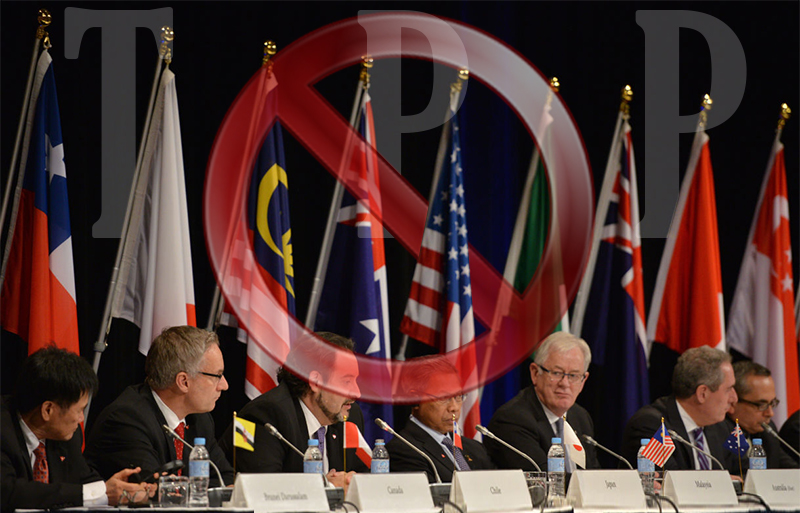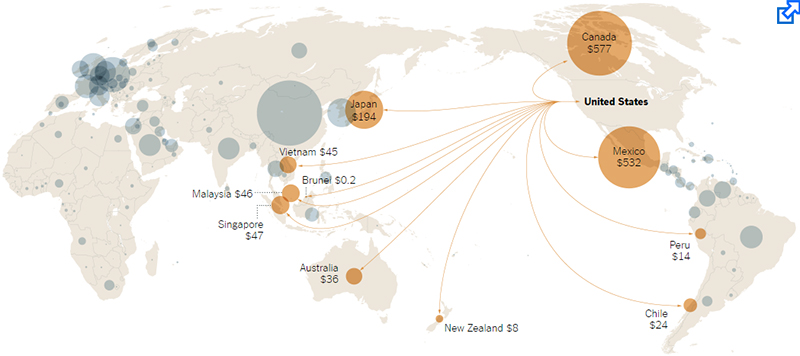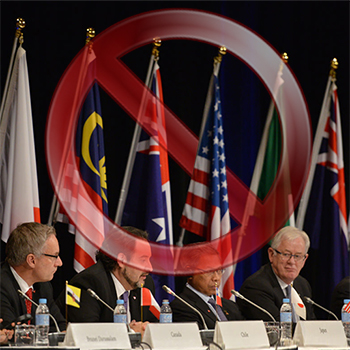The Trans-Pacific Partnership is Dead, for Now

Sen. Charles E. Schumer, who is expected to be the incoming Senate minority leader told labor leaders this week that the Trans-Pacific Partnership, the trade deal at the center of President Obama’s “pivot” to strengthen ties with key Asian allies, will not be ratified by Congress.
President-elect Donald Trump's “Contract with the American Voter” outlining sweeping changes for his first months in office has several bipartisan slam dunks, but other proposals are dead on arrival – even in a Congress controlled by his own party.
Incoming Senate Minority Leader Chuck Schumer on Thursday told trade unions the Trans-Pacific Partnership trade deal is dead in the new Congress, aligning with a key element of Trump's agenda for the first 100 days.
The news, cheered by labor unions, means Trump's call to scrap the TPP will likely happen.
The deal was negotiated by the Obama administration and initially enjoyed bipartisan support in Congress before it became a hot-button issue in the campaign.
Trump excoriated the agreement, between the United States and several Asian nations, as a job-killer and much of the Republican support for it in Congress evaporated.
Senate Majority Leader Mitch McConnell has told The New York Times there was no chance it would pass the Senate and House Speaker Paul Ryan said he does not plan to bring it up for a vote in his chamber.
Obama’s signature global trade deal had been on life support for months as both Democrats and Republicans campaigned against unfair trade policies ahead of the Nov. 8 election. And Donald Trump’s triumph in the presidential race cemented its fate.
“There is no way to fix the TPP,” Trump said in a June economic address. “We need bilateral trade deals. We do not need to enter into another massive international agreement that ties us up and binds us down.”
Retailers had largely thrown their support behind TPP, as it would have reduced tariffs on many goods that brands source from overseas. President Obama had even used Nike’s Oregon headquarters as backdrop for a speech defending his trade policy.
“On balance, [TPP] was viewed by our industry as a win for retailers and our consumers,” said David French, the National Retail Federation’s senior vice president of government relations, in an interview conducted Thursday prior to the news of Schumer’s statements.
French said he believes that the reduction in tariffs would have been passed on to consumers in the form of lower prices. Tariffs on footwear can be as high as 67.5 percent, according to the NRF, while apparel tariffs can be up to 32 percent.
In September, a coalition of retailers - including Walmart, JCPenney, Gap, Michael Kors and Dick’s Sporting Goods - sent letters to each member of Congress to urge them to support the TPP.
The letter said the agreement would remove $2.8 billion in duties on U.S. imports of clothes, shoes and travel items such as backpacks. They called it “once-in-a-generation opportunity to reduce costs and open new markets for U.S. brands and retailers,” which was also support by the U.S. Coalition for TPP organization.
This Was the Trans-Pacific Partnership
Trans-Pacific Partnership Countries - Total goods traded with the United States in 2015, Imports plus exports, not including services, in billions of dollars

Related TPP Related White Papers
TPP Agreement Holds Potential for Retailers and American Families
This report, prepared by The Trade Partnership for NRF, describes how the TPP will have a significant positive impact on American families, workers and the retailers who seek to provide them with a wide range of goods at affordable prices. Download Now!
Supply Chain Visibility & Total Landed Cost in the Global Supply Chain
Global shippers are well aware of the number of new trade agreements being inked that will make it easier for U.S. organizations to not only source product from emerging markets, but also open the door to deliver goods into quickly growing consumer bases. Download Now!
Industries and Jobs at Risk if the Trans-Pacific Partnership Does Not Pass
If the the Trans-Pacific Partnership does not pass, the United States would not only forego substantial economic gains, but would also face trade diversion and enjoy less market access compared with other countries such as China. Download Now!
Article Topics
Amber Road News & Resources
Logistics Platforms: Ways Companies Can Win In the Digital Era Ethical Sourcing – The Business Imperative (and Advantage) How Rules of Origin Really Do Make a Difference for Sourcing Practices E2open’s acquisition of Amber Road is a done deal E2open Completes Acquisition of Amber Road Bridging the Data Gap Between Sourcing and Logistics Medical Technologies Company Remedies Complex Compliance Operations More Amber RoadLatest in Supply Chain
How Supply Chains Are Solving Severe Workplace Shortages SAP Unveils New AI-Driven Supply Chain Innovations How Much Extra Will Consumers Pay for Sustainable Packaging? FedEx Announces Plans to Shut Down Four Facilities U.S. Manufacturing is Growing but Employment Not Keeping Pace The Two Most Important Factors in Last-Mile Delivery Most Companies Unprepared For Supply Chain Emergency More Supply Chain

















